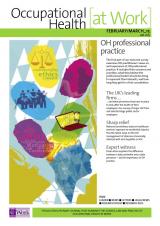February/March 2015 (vol. 11/5)
ContentsFeaturesNewsLegal
NewsResearch DigestResearch PlusCPD
Research Plus
Stress reduction in healthcare workers
An updated Cochrane systematic review of occupational stress in healthcare workers (HCWs) finds that cognitive-behavioural training, mental relaxation (eg mindfulness) and physical relaxation (such as massage) all have moderately beneficial effects in lowering stress levels. It also recommends that organisational interventions should focus on addressing specific stress-causing factors. Fifty-eight randomised controlled trials were included. There is: low-quality evidence that cognitive behavioural interventions compared to no intervention reduced stress in seven studies with follow-up of one to six months (standardised mean difference (SMD) = -0.38; CI -0.59–-0.16); low-quality evidence that relaxation-based interventions reduced stress in studies with follow-up of less than one month (SMD = -0.48; CI – 0.89–-0. 08) or greater than six months (SMD = -1.89; CI -2.65–-1. 13); and moderate-quality evidence that relaxation-based interventions reduced stress in 12 studies with more than six months’ follow-up (SMD = -0.49; CI -0.78–-0. 21). There is low-quality evidence that changing work patterns can reduce stress levels; two trials found that, for intensive care staff, work schedules with weekend breaks reduced stress compared with continuous work schedules (SMD = – 0.55; CI -0.84– -0.25). Publication bias and lack of methodological precision contributed to the generally low-quality evidence.
Cochrane Database of Systematic Reviews 2014; 12: CD002892. doi: 10.1002/14651858.CD002892.pub4.
Occupational Health at Work February/March 2015 (vol. 11/5) pp40



